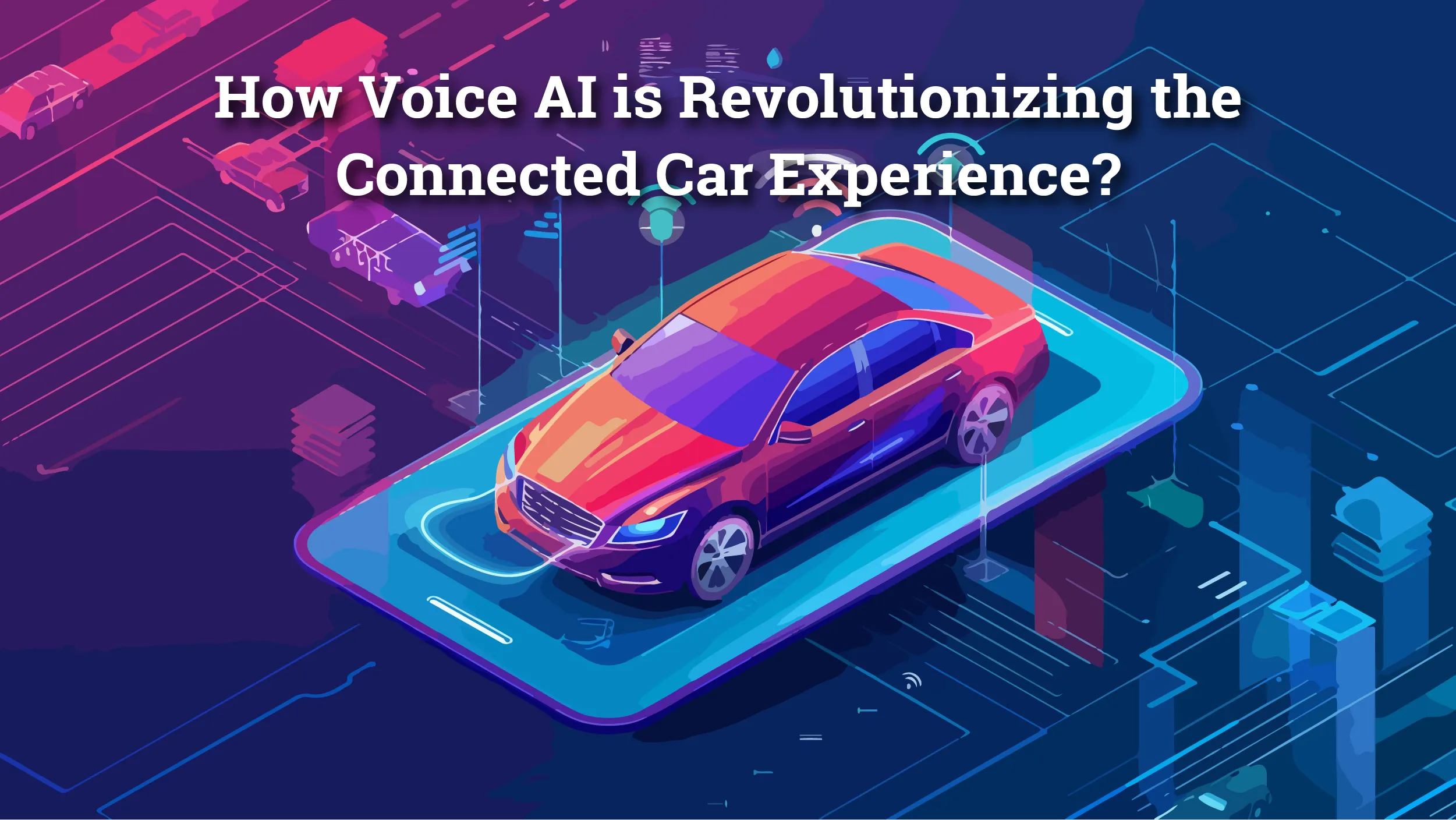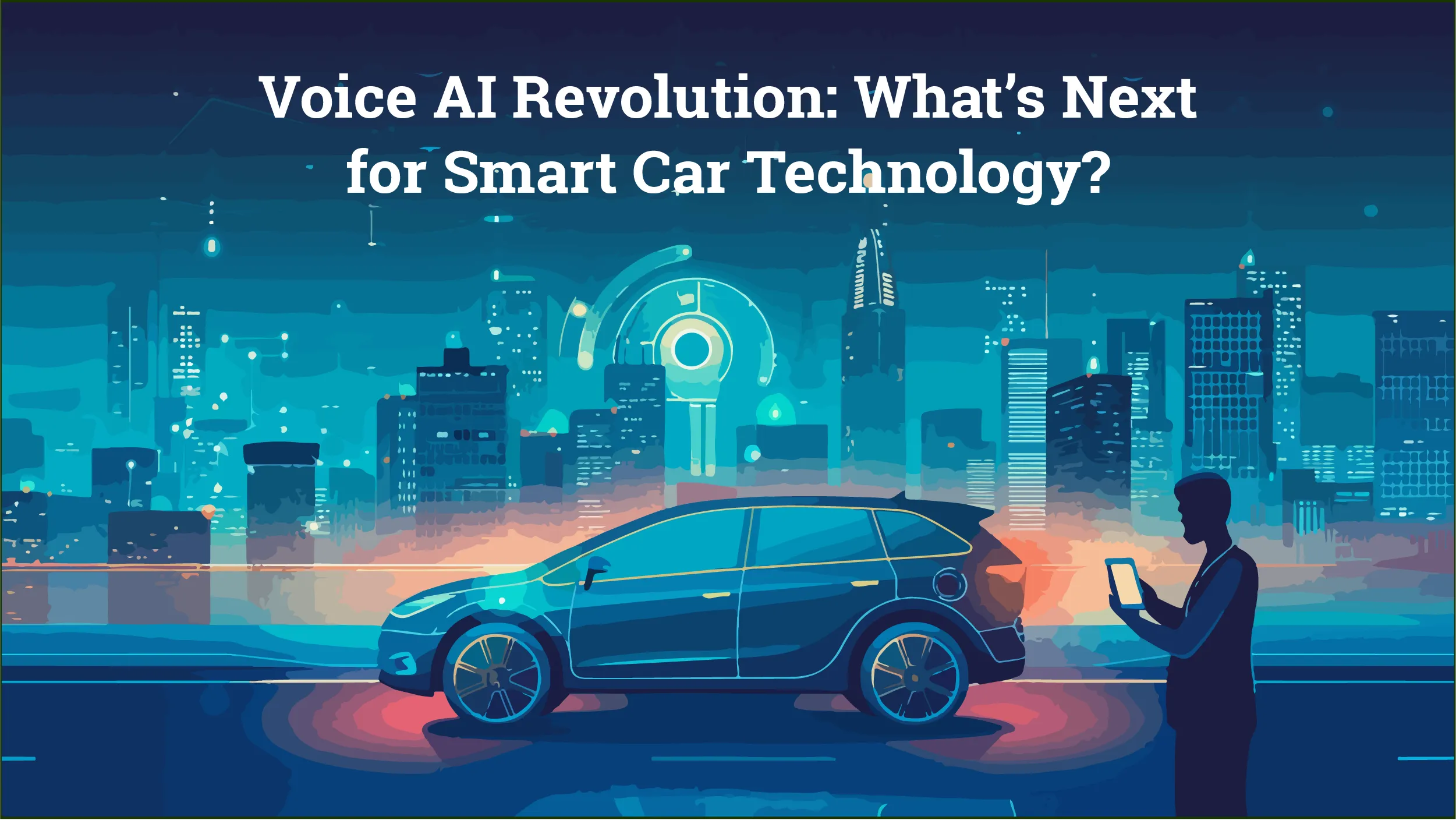The automotive industry is going through a notable shift, largely thanks to the rise of voice AI. It’s making cars smarter, more personalized, and way more connected.
As more drivers seek to use this technology to optimize their time behind the wheel, car manufacturers must stay up with the trend and provide the most recent technology.
The push for voice AI in cars is also being driven by the demand for self-driving vehicles and new safety regulations. A recent report from the UK’s Transport Research Laboratory found that touchscreens are way more distracting for drivers than voice-activated systems.
As a result, there is an increasing trend toward voice-controlled cars. This complete guide will cover all you need to know about smart car technology. Let’s dive in!
What is Voice AI?
Voice AI, or voice artificial intelligence, refers to the technology that allows machines to comprehend and respond to human speech. It leverages machine learning algorithms and natural language processing to analyze and interpret spoken language. This technology powers a range of applications, including virtual assistants, smart home devices, and in-car voice systems.
How Voice AI is Revolutionizing the Connected Car Experience?

Voice AI is playing a transformative role in enhancing the connected car experience, bringing convenience, safety, and personalization to drivers and passengers. Here are some key ways in which this technology is revolutionizing this space:
● Hands-Free Control & Safety
This technology allows drivers to interact with the car’s systems without needing to take their hands off the wheel or their eyes off the road. This promotes safer driving by enabling hands-free operation for tasks like:
- Navigating GPS systems
- Controlling music or adjusting climate settings
- Answering or making phone calls
- Texting through voice commands
This helps reduce distractions and enhances road safety.
● Enhanced Personalization
AI-powered voice assistants can learn driver preferences over time, such as favorite routes, preferred temperature settings, or frequently played music. This allows the system to automatically adjust the car’s environment to fit the driver’s needs, creating a more comfortable and personalized driving experience.
● Smart Home Integration
With connected car systems integrating with smart home ecosystems, drivers can control smart home devices (e.g., lights, security systems, thermostats) using voice commands from within their vehicle. This adds convenience and streamlines daily tasks, allowing users to, for example, turn on home lights or adjust the thermostat before arriving home.
● Real-Time Information & Assistance
Voice commands can provide drivers with real-time updates on traffic, weather, nearby fuel stations, or points of interest. It can also make restaurant or hotel reservations while driving, providing a concierge-like service that is always accessible. As more vehicles become connected to the internet, these systems will improve their ability to give actionable, real-time insights based on the driver’s immediate context.
● Natural Language Processing (NLP) Advancements
Modern systems are becoming more conversational, with advancements in NLP allowing them to understand more complex commands, slang, and regional accents. This leads to a more intuitive interaction, allowing users to speak naturally rather than memorizing specific commands.
● In-Car Entertainment
With voice-activated entertainment systems, passengers can control multimedia options, such as streaming services, games, or podcasts. This improves the overall travel experience, particularly on long drives.
● Predictive Maintenance & Diagnostics
Voice AI systems can notify drivers about potential maintenance issues by monitoring car performance. With the use of predictive analytics, the system can inform users about necessary repairs or when the car needs service, improving the longevity and reliability of vehicles.
● Integration with Navigation and Ride-Sharing
Navigation is greatly enhanced with voice AI, as it can predict traffic conditions, reroute based on real-time data, and suggest alternative routes. In the ride-sharing space, platforms can utilize voice technology to streamline driver and passenger interactions, making the experience smoother and more efficient.
● Vocal Biometric Authentication
It also enables voice recognition, allowing drivers to unlock their vehicle or start the engine simply through vocal commands. This offers a more secure and convenient alternative to traditional keys or key fobs.
Also Read: What is Automotive Computing and What Are its Benefits?
Autonomy Paving the Way
Driverless vehicles and the technologies behind them are accelerating the adoption of voice AI in the automotive industry.
In connected cars, AI’s ability to provide environmental “awareness” promises to enhance road safety, reduce traffic congestion, and improve accessibility for all.
One notable advancement in autonomous driving is Tesla’s Full Self-Driving Beta. The v12 release, announced in January 2024, leverages AI to process sensor data, make real-time decisions, and use specialized neural networks to navigate the vehicle. Another significant example is Waymo Driver, which has powered 7.1 million driverless miles in the U.S., showing a reduction in police-reported crashes compared to human-driven vehicles during testing.
Voice AI Revolution: What’s Next for Smart Car Technology?

The future of voice AI in connected cars is poised for transformative developments that will redefine the driving experience. As technology advances, it will become increasingly adept at understanding and responding to natural language, enabling more intuitive and seamless interactions between drivers and their vehicles. We can expect enhanced personalization features, where voice assistants will predict and cater to individual preferences with remarkable accuracy, adjusting settings such as temperature, navigation routes, and entertainment options in real time.
Integration with smart home systems will deepen, allowing drivers to control home devices and access home security features directly from their vehicles. Moreover, the sophistication of voice AI will enable more sophisticated safety features, such as real-time hazard detection and adaptive driving assistance based on vocal commands.
Furthermore, as autonomous driving technology evolves, the technology will play a crucial role in managing and communicating with fully self-driving vehicles, allowing passengers to interact with their car in a more natural and user-friendly manner.
Summing it Up
Voice AI is revolutionizing the automotive industry by transforming how we interact with our vehicles. With advancements in automotive AI, voice-controlled cars are becoming increasingly intuitive, allowing for seamless in-car voice commands that enhance safety, convenience, and personalization. As this technology continues to evolve, it promises to deliver even more sophisticated and responsive driving experiences, making voice AI an integral component of the connected car of the future.




